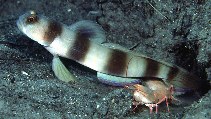| Family: |
Gobiidae (Gobies), subfamily: Gobiinae |
| Max. size: |
25 cm SL (male/unsexed) |
| Environment: |
reef-associated; brackish; marine; depth range 5 - 30 m |
| Distribution: |
Western Pacific: Sumatra to the Moluccas, north to the Philippines; Palau in Micronesia. Reported from Papua New Guinea (Ref. 6771) and south of Taiwan (Ref. 5193). |
| Diagnosis: |
Dorsal spines (total): 7-7; Dorsal soft rays (total): 15-15; Anal spines: 1-1; Anal soft rays: 16-17. Characterized by whitish body color; head and body with five brown bars; small orange spots on head; first dorsal fin with large dark blotch; pelvic fins fully united with well developed frenum; predorsal scales extending forward to less than orbit diameter from interorbital space; longitudinal scale series 110; greatest depth of body 5.8-6.3 in SL; pointed caudal fin, longer than head (Ref. 90102). |
| Biology: |
Inhabits silty inshore bottoms, deep coastal mud slopes and also occurs in estuaries in muddy channels (Ref. 48637). Also found in sand bottoms of lagoons and sheltered reefs in 5-30 m (Ref. 90102). |
| IUCN Red List Status: |
Least Concern (LC); Date assessed: 26 August 2020 Ref. (130435)
|
| Threat to humans: |
harmless |
Source and more info: www.fishbase.org. For personal, classroom, and other internal use only. Not for publication.
